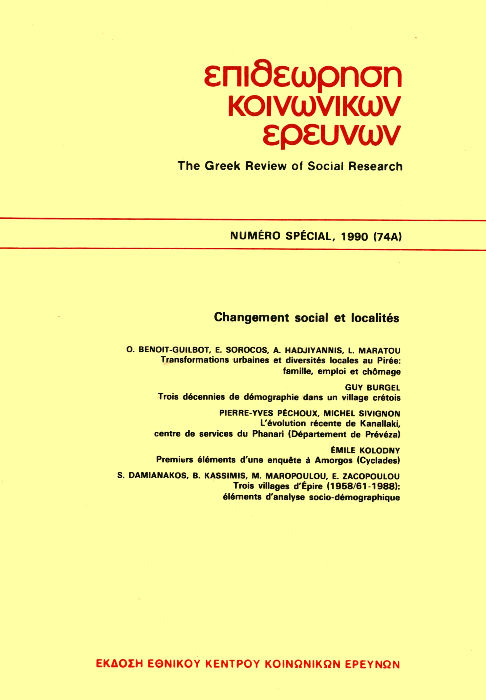Safe constituencies in epirus: A quantitative analysis of elections in the department of loannina between 1956 and 1964
Abstract
Sale constituencies, as a privileged manifestation of patronage rela
tionships in Greek countryside, constitute a particular mode of
peasants’ insertion in the political life of the country and illustrate a
kind of relations between Power and basic structures (village
sociability). The maintenance, transformation or decline of these rela
tions attest the differentiated evolutions that traditional societies
undergo according to the uneven penetration of capitalist relations,
and reveal to what extent the patronage system, stops, deflects,
moderates, transforms or conceals the class aspects of social conflicts.
The electoral process during the last five ballots in the department of
loannina, between 1956 and 1964, has been quantitatively analysed
in this perspective. Such an approach strongly contrasts with tradi
tional studies in electoral sociology: the prime objective is not the
study of geographic distribution of political parties' influence or the
measurement of the impact on voting decisions of some variables; it is
rather the analysis, the votes resulting from social mechanisms
and the quantitative evaluation of these mechanisms. The peasant
electorate is not considered as a category among others at the na
tional level, it is endowed with a specificity which consists not in
«who» is chosen but in «how» the choice is made. The unit selected
for analysis is the village (considered as the most relevant level of ag
gregation for the selected variables), and not the districtor the depart
ment which considerably distort (cancel, reinforce or reverse) the cor
relations or associations found in smaller units. This paper presents
part of the results of this research: in chapter one,the regional context
is examined through a set of demographic, geographic and cultural
variables. In chapter two are studied the connections between these
variables and one constructed variable («voting behaviour») suppos
ed to measure the hold of patronage relationships in each village. In
the last chapter, a model of multivariate analysis is proposed, which
leads to a typology of the social and electoral configurations in the
area. The maps provided with point out significant geographic con
tinuities and discontinuities.
Article Details
- How to Cite
-
Damianakos, S. (1981). Safe constituencies in epirus: A quantitative analysis of elections in the department of loannina between 1956 and 1964. The Greek Review of Social Research, 49–92. https://doi.org/10.12681/grsr.568
- Issue
- 1981: Numero Special
- Section
- Articles

This work is licensed under a Creative Commons Attribution-NonCommercial 4.0 International License.
Authors who publish with this journal agree to the following terms:
- Authors retain copyright and grant the journal right of first publication with the work simultaneously licensed under a Creative Commons Attribution Non-Commercial License that allows others to share the work with an acknowledgement of the work's authorship and initial publication in this journal.
- Authors are able to enter into separate, additional contractual arrangements for the non-exclusive distribution of the journal's published version of the work (e.g. post it to an institutional repository or publish it in a book), with an acknowledgement of its initial publication in this journal.
- Authors are permitted and encouraged to post their work online (preferably in institutional repositories or on their website) prior to and during the submission process, as it can lead to productive exchanges, as well as earlier and greater citation of published work (See The Effect of Open Access).




